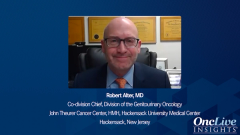
Toxicities with IO-TKI Combination Regimens for Advanced RCC and Their Management
Elan Diamond, MD, explains toxicities commonly seen with I/O–TKI combination regimens, how to manage them, and how to discuss toxicities with patients with advanced renal cell carcinoma.
Episodes in this series

Robert Alter, MD: Elan, what toxicity did you see with the I/O [immuno-oncology]–TKIs [tyrosine kinase inhibitors]? What do you commonly see? How do you manage them?
Elan Diamond, MD: Toxicities are quite common. For example, in the CLEAR trial, there was a 70% discontinuation rate due to toxicities. The major challenge with toxicities with I/O–TKI combinations is that it’s often hard to discern what’s being caused by the TKI and what’s being caused by the immunotherapy. A guide would be that TKI adverse effects are usually earlier in the treatment course and tend to be a little more low grade. The I/O adverse effects after several weeks tend to be a little more fulminant and can cause systemic symptoms. But the potential adverse effects can include diarrhea, constipation, nausea, vomiting, and stomatitis.
In the CLEAR trial, the diarrhea took about 28 weeks to develop. That was in a later analysis. It can cause fatigue, weight loss, dysphonia, rash on the hands and the feet, hypothyroidism, and hypertension. There were also severe adverse reactions, like cardiac dysfunction, severe hypertension, osteonecrosis of the jaw, and fistula formation. There’s quite a bit to think about as a practicing oncologist using these agents. In general, if the patients have grade 2 or 3 toxicity from TKIs, I’ll discontinue until resolution of those symptoms. If it’s grade 1, I’ll restart at a dose reduction. If I think the adverse reaction is being caused by the immunotherapy, it depends on the grade. There was an excellent guide in the NCCN [National Comprehensive Cancer Network] Guidelines under the supportive care section on managing immune-related adverse events. We’ll talk more about that later in the discussion.
Robert Alter, MD: With this patient, I followed the guidelines. Based on the clinical trial, I went from 20 mg down to 14 mg. He did well but still has grade 1 fatigue. The diarrhea pretty much resolved but still requires Lomotil. I’m not interested in dose escalating. We have him at a good place.
After a while, the toxicities can be very much a deterrent to the patient benefiting from therapy or having to hold or discontinue therapy, physically and mentally. A lot of times, they come into a better dosing schedule with better tolerability. The durability and positive reinforcement about less toxicity gives the patient a lot more desire to remain on therapy. We believe that sometimes efficacy is driven by potency, so we should be trying to give as much of the drug as possible and that we’d see better efficacy. But when you see many clinical trials, maintaining patients on therapy is better than having patients come off therapy. The efficacy is driven by durability rather than trying to push toxicity.
Brian Rini had great data using axitinib and dose escalating based on hypertension, which was proven to be a biomarker. But that’s the only time I’d recommend dose escalation short of reintroducing the therapy back to the patient. We should be more cognizant of the patient and not necessarily the dosing. Then there’s the question of what to do. Do I keep them on therapy? Do I discontinue the TKI and possibly improve his quality of life? Is it the TKI that got him the benefit? Is it the maintenance of immunotherapy? These are questions we don’t know the answers to.
The studies had patients receive pembrolizumab for 2 years. I’ll probably follow suit on that trial. As long as he doesn’t have TKI toxicities, we’ll probably maintain him at 14-mg doses of lenvatinib. The result being what it is, he’s in no rush to change his regimen. It’s proven to be successful. I won’t even call it superstition. I call it data. He has data that prove the benefit of what he’s having. But there’s that big concern about chronic TKI toxicity. Every I/O–TKI study that we talked about talks about health-related quality-of-life factors, when it comes down to it. Dr [Robert] Motzer presented something at ASCO [American Society of Clinical Oncology Annual Meeting] in June 2021. Do you want to talk about that?
Elan Diamond, MD: Absolutely. The presentation by Dr Motzer was an analysis of the secondary end point of the CLEAR trial, which was a study of lenvatinib-pembrolizumab or lenvatinib-everolimus vs sunitinib in the frontline setting for metastatic clear cell renal cell carcinoma. In this analysis, they used 3 measures of quality of life in longitudinal analysis and in analysis of time to deterioration. They found that for lenvatinib-pembrolizumab vs sunitinib, scores were very similar or there was an improvement from baseline, and this was in physical functioning dyspnea or constipation. There was also an improvement in median time to deterioration for patients who were treated with lenvatinib-pembrolizumab vs sunitinib.
The same thing wasn’t true for lenvatinib-everolimus vs sunitinib. The scores were better for sunitinib, which isn’t surprising for people who use that regimen, especially in the second-line setting. The question is how to apply this in our practice. It reassures me that lenvatinib-pembrolizumab is going to be a fairly tolerated regimen in general. The thing to understand is that this was compared with sunitinib, which is a fairly toxic drug in and of itself that we don’t really use anymore. We also have to take into account our clinical experience. In my experience, and I’m sure yours as well, lenvatinib has its toxicities and challenges in terms of management. But in general, it’s something that we can safely give our patients.
Robert Alter, MD: Right. That’s exactly what you have to think. I always tell my patients, “It’s not about the first mile. It’s about the whole marathon.”
Transcript edited for clarity.








































